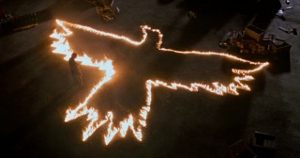 I have a confession to make: as a Crow fan from way back. Before the Kitchen Sink Press Author’s Edition, I was there. Before the crappy TV series, I was there. Before Brandon Lee’s untimely and unfortunate death eclipsed almost everything else associated with this film, and the story it contains, I poured over J. O’Barr’s black and white catharsis of a comic. And I loved it. To my teenage mind, this psychopathic little story seemed an expression of love. The kind of mournful, melodramatic love adolescents, and the perpetually adolescent at heart, believe is really all there is.
I have a confession to make: as a Crow fan from way back. Before the Kitchen Sink Press Author’s Edition, I was there. Before the crappy TV series, I was there. Before Brandon Lee’s untimely and unfortunate death eclipsed almost everything else associated with this film, and the story it contains, I poured over J. O’Barr’s black and white catharsis of a comic. And I loved it. To my teenage mind, this psychopathic little story seemed an expression of love. The kind of mournful, melodramatic love adolescents, and the perpetually adolescent at heart, believe is really all there is.
I even wrote my own piece of Crow fan fiction. And before you ask, no, you can’t look at it. It died a thankful and unceremonious death several computer crashes ago. I wrote it over the course of a month at age sixteen, the perfect time to write a violent revenge fantasy centered around the above definition of “love.” And in the course of writing it I discovered something O’Barr must’ve realized ?himself: that vengeance is not catharsis. In the end, it’s only vengeance. A ravenous, yawning beast that will not stop until its consumed everything it touches. Something this movie’s two screenwriters completely failed to realize.

Instead, the visionary screenwriter of Leatherface: The Texas Chainsaw Massacre III, David J. Schow, and the visionary screenwriter of one whole episode of The Real Ghost Busters, John Shirley, chose to convert O’Barr’s violent love note into an Action film with a strange undercurrent of Old Testament fantasy. In true Hollywood fashion, they use a child’s voice to introduce the fantastical elements. “People once believed,” our child’s voice informs us, “that when someone dies, a crow carries their soul to the land of the dead. But sometimes, something so bad happens that a terrible sadness is carried with it and the soul cannot rest. Then sometimes, just sometimes, the crow can bring that soul back to put the wrong things right.”
The speaker is Sarah (Rochelle Davis in, sadly, her only Imdb credit), a part-time street kid and full-time friend of two twenty-something, Detroit hipsters…who, sadly for Sarah, die before the opening credits. The victimized couple are Eric Draven (Brandon Lee), a musician, and his activist fiancee, Shelly (Sofia Shinas), who made the mistake of trying to fight tenant eviction in Murder City’s crime-ridden downtown. Exit Eric and Shelly, leaving Sarah to mourn in the arms of Sgt. Albrecht (Ernie “Winston Zeddemore” Hudson), the local Good Cop.
 A year passes, and Detroit’s annual arson party, Devil’s Night, comes ’round again. The gang of sociopathic criminals who murdered Shelly and Eric still roam the streets unchecked. One of them, a sycophantic junkie named Fun Boy (Michael Massee), is even making time with Sarah’s mom (Anna Thompson). And in a perfect example of Alex Proyas’ expert direction, we see the gang torch an arcade even as, half a city away, Eric crawls out of his own grave, bound over for some vengeance.
A year passes, and Detroit’s annual arson party, Devil’s Night, comes ’round again. The gang of sociopathic criminals who murdered Shelly and Eric still roam the streets unchecked. One of them, a sycophantic junkie named Fun Boy (Michael Massee), is even making time with Sarah’s mom (Anna Thompson). And in a perfect example of Alex Proyas’ expert direction, we see the gang torch an arcade even as, half a city away, Eric crawls out of his own grave, bound over for some vengeance.
Somewhat befuddled by this, tortured by visions of his own death and (even more horribly) visions of Shelly’s, Eric allows a fat, noisy bird to guide him back to his former loft. Amidst the detritus of his life, Eric paints his face up, dons the only pair of black clothes in sight, and embarks on an extended quest to avenge his (and Shelly’s) death. The remainder of the film follows Eric’s blood- and gasoline-soaked path through Detroit’s dark sides, an extended action scene stoked with violent energy, rarely interrupted, and only when the plot absolutely calls for it. He crosses paths with Sarah and Officer Albrecht on occasion and, apart from flashbacks to Happier Times at Eric and Shelly’s, these bits provide the only quiet moments in what would otherwise be an unrelenting, postmodernist, urban nightmare of a film. Much like O’Barr’s original strip which, for all the shit I’ve given it, remains one of the most articulate and honest portrayals of personal bereavement I’ve ever seen, heard, or read.
When someone we love dies they take a bit of us with them, into the ground. The resulting hole in our hearts and minds forms its own nihilistic vacuum, a vengeance-powered weapon that cries out for targets. Enemies! Something to batter down and claw apart and rend into dripping shreds because, goddamn it, it’s not fair. Whatever it is. Faced with Death, powerless against it, we crave omnipotence, immortality…the power to “make the wrong things right,” and damn anyone else and their competing considerations of what “right” and “wrong” might be.
 So it’s no wonder Eric returns as an invulnerable zombie superhero, cut straight from the Bronze Age Punisher/Wolverine mode. As the Goth’s own Dirty Harry, a lone seeker of justice, Brandon Lee brings an unsettling brand of mad energy to this role, acting like just what he is: a man trapped in a nightmare, using one-liners and bad jokes to hold back the screams. A trend-setting role if every there was one, Lee would’ve no-doubt been forced to spend the rest of his life playing Action Hero, just in time for its decline. Every Crow lead to date has done a piss poor job imitating him, because it simply can’t be done. In other hands the role feels false, even pretentious. Lee maintains exactly the emotional razor’s-edge he needs to take his role as undead avenger seriously. None have yet matched his skills.
So it’s no wonder Eric returns as an invulnerable zombie superhero, cut straight from the Bronze Age Punisher/Wolverine mode. As the Goth’s own Dirty Harry, a lone seeker of justice, Brandon Lee brings an unsettling brand of mad energy to this role, acting like just what he is: a man trapped in a nightmare, using one-liners and bad jokes to hold back the screams. A trend-setting role if every there was one, Lee would’ve no-doubt been forced to spend the rest of his life playing Action Hero, just in time for its decline. Every Crow lead to date has done a piss poor job imitating him, because it simply can’t be done. In other hands the role feels false, even pretentious. Lee maintains exactly the emotional razor’s-edge he needs to take his role as undead avenger seriously. None have yet matched his skills.
Unfortunately, his opponents are another matter. Since a hero is measured by his villains, our screenwriters felt the need to turn Eric’s into stereotypical, Hollywood gangsters, led by the flamboyant Top Dollar (the typecast Michael Wincott) and his mystic sister, Mica (Ling Bai), villains so apparently Badass, they’ve got Tony Todd playing their right hand man. I’d expect that to be the other way ’round, and maybe having Wincott and Todd switch roles would’ve helped. We’ll never know. As it is, Wincott does a believable job…but how hard is it to play unrepentant, dyed-in-the-wool Evil? Worst case scenario, these kinds of sociopaths make up (maybe) two percent of our population, yet The Crow would have us think 97% of them call Detroit home, and are busily clawing their way over each other in a continuing quest to climb the criminal food chain.
 Wincott, Todd and Bai stand alone among the villainous cast in that they’re called upon to project intelligence. The rest are unapologetic stereotypes. How else would we cheer their deaths so easily? At times, The Crow feels like an inverse Slasher movie. Had Shelly Webster risen in Eric’s place the metaphor would be complete…shades of Schow’s previous work. If I have any real bones with this film, they lie in all the little ways it’s story has been Hollywoodized, Action Movie-ed up to play well for the Rambo kids, the Die Hard generation.
Wincott, Todd and Bai stand alone among the villainous cast in that they’re called upon to project intelligence. The rest are unapologetic stereotypes. How else would we cheer their deaths so easily? At times, The Crow feels like an inverse Slasher movie. Had Shelly Webster risen in Eric’s place the metaphor would be complete…shades of Schow’s previous work. If I have any real bones with this film, they lie in all the little ways it’s story has been Hollywoodized, Action Movie-ed up to play well for the Rambo kids, the Die Hard generation.
But it’s Alex Proyas who really drives this film, mixing miniature cityscapes with moody, noir sets and a neutral palette of blacks, whites, and reds perfectly fitting the material. This is one of the rare instances Ebert and I agree: this is an exceptional comic book film, bringing the static medium’s artistic sense to the mobile world of film. I haven’t seen a city this apocalyptic since Tim Burton’s Gotham, Paul Verhoeven’s Old Detroit, or Sam Raimi’s LA, as seen in Darkman. Proyas would go on to allow his imagination free reign in his next film, the Dark City…but the seeds of that germinated here. Proyas’ eye, along with Dariusz Wolski’s truly spectacular cinematography, make The Crow one of the best looking superhero films of the mid-90s, perhaps of all time.
 But it is not a love story, as I once believed. It is, first and foremost, a revenge fantasy. That sub-genre has its own long and special history, beginning with the Death Wish films of the mid-70s. Charles Bronson didn’t need a telepathic bird to get his vendetta on. Neither did John Rambo, or any of his mad children. They had the guns we so, so love, and that was enough. For awhile. Ah-nold fully dehumanized them, and Bruce Willis humanized them again. A year before The Crow‘s release, Ah-nold even made fun of them, and himself, something no one liked. But The Crow gave generations of anti-social fantasists a vision of themselves as omnipotent avenger. For that, I thank it eternally and declare it one of my favorite films, despite all the horrors I can lay at its feet. Like its horrifically-bad sequels.
But it is not a love story, as I once believed. It is, first and foremost, a revenge fantasy. That sub-genre has its own long and special history, beginning with the Death Wish films of the mid-70s. Charles Bronson didn’t need a telepathic bird to get his vendetta on. Neither did John Rambo, or any of his mad children. They had the guns we so, so love, and that was enough. For awhile. Ah-nold fully dehumanized them, and Bruce Willis humanized them again. A year before The Crow‘s release, Ah-nold even made fun of them, and himself, something no one liked. But The Crow gave generations of anti-social fantasists a vision of themselves as omnipotent avenger. For that, I thank it eternally and declare it one of my favorite films, despite all the horrors I can lay at its feet. Like its horrifically-bad sequels.
![]()
![]()
![]()
![]()
